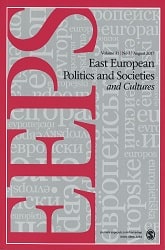The Broken Covenant of Tito’s People: The Problem of Civil Religion in Communist Yugoslavia
The Broken Covenant of Tito’s People: The Problem of Civil Religion in Communist Yugoslavia
Author(s): Sergej FlereSubject(s): Civil Society, Political history, Government/Political systems, Politics and religion, WW II and following years (1940 - 1949), Post-War period (1950 - 1989), History of Communism
Published by: SAGE Publications Ltd
Keywords: civil religion; Josip Broz Tito; Yugoslavia; broken covenant; Communism; charisma;
Summary/Abstract: The author attempts to demonstrate that the concept of civil religion is appropriate and illuminating in comprehending the culture and society of Communist Yugoslavia (1945-1991). Though manifestly contrary to theism, numerous elements of this civil religion make it deserving of the name: it contained a tale of an alleged sacred historical past and a transhistorical mission of the Yugoslav peoples, including an eschatology, and a sacred covenant. President Tito’s charisma was the major element of this civil religion, the idea of a broken covenant was present, along with the rule of equalitarianism (particularly as a wealth taboo) at the ethical level. When Tito’s physical presence disappeared, the entire civil religion was doomed (there was no possibility of routinizing and depersonalizing charisma), as well as the society it legitimated. Because of the charismatic nature of legitimation and the basically authoritarian nature of this cultural pattern, transformation into rational-legal legitimation was blocked.
Journal: East European Politics and Societies
- Issue Year: 21/2007
- Issue No: 04
- Page Range: 681-703
- Page Count: 23
- Language: English
- Content File-PDF

